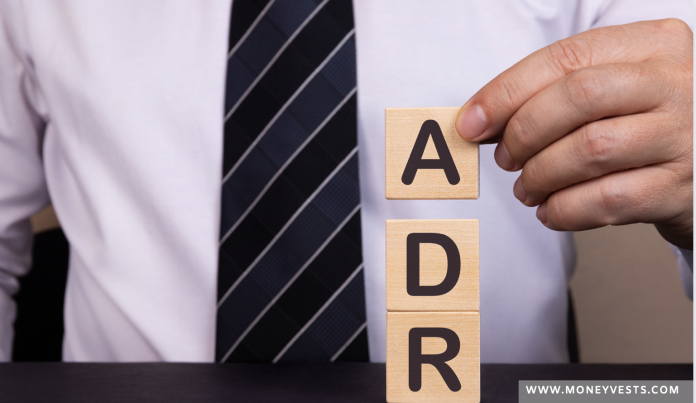American Depositary Receipts?
If you are wondering “What is the meaning of American depositary receipts?” then you’re not alone. You may also be wondering what book-entry ADRs are and why they’re important for investors.
These financial instruments represent ownership rights to shares of a foreign security and can be traded like stocks. Here’s a primer on each type of ADR:
Regulation S shares
ADRs, or American depositary receipts, are essentially securities issued to non-U.S. persons but are not registered with the Securities and Exchange Commission.
Generally, Regulation S shares cannot be held by U.S. persons, so they must be issued to offshore entities that do not have to be incorporated in the US. Regulation S shares can be merged into a Level 1 program once the restricted period ends.

Reg S and 144A are sections of the US Securities Act of 1933. The Reg S is issued by US companies and Qualified Institutional Buyers. Generally, Reg S shares cannot be traded on US exchanges or traded over the counter, but are held by foreign investors.
In addition to allowing investors to trade non-US securities, ADRs have additional benefits. They help the issuer increase its brand recognition in the US market.
Unsponsored ADRs
In a recent decision, the U.S. Court of Appeals for the Ninth Circuit ruled that unsponsored American depositary receipts (ADRs) are securities transactions.
The case involved Toshiba Corporation, a Japanese corporation whose common stock is only traded on the Tokyo Stock Exchange.
In Stoyas, plaintiffs alleged that Toshiba had issued misleading statements to investors that artificially inflated the value of its unsponsored ADRs in the U.S.
Today, Unsponsored ADRs are traded on the U.S. stock market and are used by many large global corporations as a way to attract U.S. capital.
As an example, Royal Mail PLC (a British postal and delivery company founded by Henry VIII) offers an unsponsored ADR. It trades under the ticker symbol ROYMY.
This type of investment allows investors to diversify their portfolios and avoid cross-border custody fees. ADRs also provide investors with research and trading information.
Global depository receipts
Global Depositary Receipts, or GDRs, are similar to American depositary certificates, but they are traded outside of the United States or the home country of the issuing company.
Global depositary receipts are bank certificates issued by depository banks in other countries and act as shares of the company.
The largest depositary banks are in the United States, including JP Morgan and Bank of New York Mellon.
The primary advantage of American Depositary Receipts is their access to foreign markets. They are denominated in US Dollars or Euros, and act like shares, trading in markets.
They provide shareholder benefits to different investors and help companies to draw international attention.
On the downside, however, they are costly to invest in, and their value can fluctuate wildly if the currency value of a country declines.
Book-entry ADRs
American depositary receipts (ADRs) are securities issued by non-U.S. companies. These ADRs make their shares available outside of their home markets, giving investors a global view.
Investors in the United States often choose to purchase these securities because they follow the conventions of the United States stock market. RB Group’s ADRs trade under the ticker symbol RDBBY.
An ADR investor benefits from lower transaction costs and a lower currency conversion fee. ADRs allow investors to trade internationally without incurring the costs of currency conversion. The only drawback is that ADRs link a foreign security to the domestic market.
However, investors need to be aware of the regulatory differences between U.S. and foreign exchanges. In addition to these differences, ADRs can also be costly for investors.
Currency conversion fees
If you’re holding American depositary receipts and you want to exchange one currency for another, you should be aware of currency conversion fees.
These fees are reflected in the price of the foreign currency for which your depositary receives a currency conversion.
Depending on the currency and exchange rate, a depositary may charge a fee or commission for executing the conversion. The DBAG may also apply a mark-up to exchange rates, which means that the DBAG will have a different rate of exchange for your foreign currency than the Depositary.
ADRs were introduced in the 1920s, when it was difficult to buy shares of foreign companies on international exchanges.
A major disadvantage of ADRs is the currency conversion fees that are associated with the foreign securities. Because of the differences in regulations between U.S. and foreign exchanges, these fees may be higher than other types of exchanges. However, there are some benefits to owning ADRs.
Trading on U.S. exchanges
Among the many U.S. stock exchanges, the New York Stock Exchange is the world’s largest.
There, buyers and sellers trade stocks on the NYSE. Trading hours on the New York Stock Exchange are Monday through Friday from 9:30 a.m. to 4:00 p.m. ET, except for holidays declared by the Exchange.
In addition to New York stock exchange holidays, the following days are also off limits for the New York Stock Exchange: Martin Luther King Jr. Day, Washington’s Birthday, Good Friday, Memorial Day, Independence Day, Labor and Thanksgiving. Finally, Christmas Eve is closed on both New York exchanges.
Unlike other international stock exchanges, the U.S. exchanges have different regulations on trading securities.
The Securities and Exchange Commission (SEC) has set a regulatory framework to protect investors and keep the markets fair and orderly. The SEC regulates exchanges, clearing agencies, and transfer agents, and sets standards for how securities are traded.
It also sets rules for stock symbols. For example, NYSE stocks must have a minimum market capitalization of $4 million and must have board members to qualify for inclusion.
Fact Check
We hope you enjoyed this article… What are your thoughts?
Рleаse let us knоw yоur thоughts in the соmments seсtiоn. Feel free to share with us in the comments section below.





